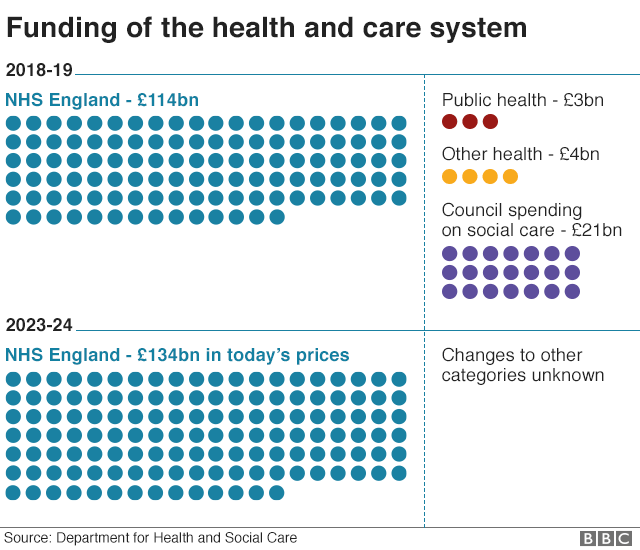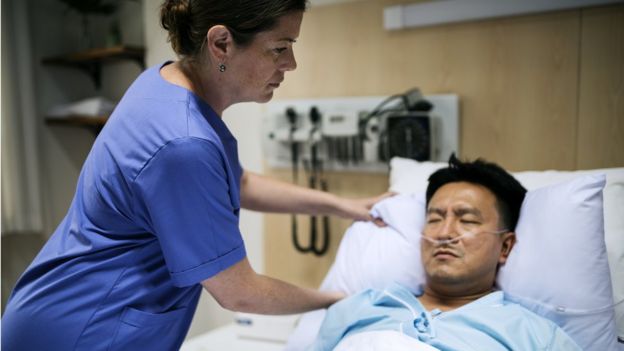NHS bosses in England say a new 10-year plan could save up to 500,000 lives by focusing on prevention and early detection.
GPs, mental health and community care will get the biggest funding increases to shift the focus away from hospitals.
Prime Minister Theresa May hailed the launch of the plan as a "truly historic moment".
But unions are concerned that staffing shortages could undermine the ambitions - one in 11 posts are currently vacant.
And some senior doctors warned hospitals were facing a "near-on impossible task."
Society of Acute Medicine president Dr Nick Scriven said he was "staggered" by the plans given the problems facing hospitals.
Many trusts are missing all three key waiting time targets for A&E, cancer care and routine operations, and are struggling to balance the books.
NHS England chief executive Simon Stevens indicated there may be changes to the current target - that at least 95% of patients attending Accident and Emergency departments should be admitted, transferred or discharged within four hours - to take into greater account clinical need.
He told BBC Radio 4's Today programme: "The problem with that is it doesn't distinguish between turning up at A&E with a sprained finger versus turning up with a heart attack.
"The top doctors in the NHS are looking at what are the most appropriate clinical standards to improve outcomes in emergency care. They will make their recommendations and then, on the back of that, we will meet them."
- Hugh Pym: Will NHS plan deliver the goods?
- May's NHS plan 'lacks funding and staffing'
- Meet the NHS duo keeping the elderly safe at home
- Six things to look out for in health in 201
- The plan, unveiled by Simon Stevens and Mrs May, committed to giving a third of the extra £20bn the NHS will get by 2023 on GPs, community care and mental health.Currently they account for less than a quarter of spending, while hospitals take up around half of the £114bn frontline budget.Mr Stevens called it a "practical, costed and phased route map" for the decade ahead.
What will the money be spent on?
Mental health is due to get £2.3bn extra of the £20bn, while GP and community care is to get £4.5bn.NHS England said that will help pay for:- Mental health support in schools and 24-hour access to mental health crisis care via the NHS 111 service
- Extra support in the community so patients can be discharged quickly from hospital and reduce the number of outpatient appointments by a third
- Digital access to health services, including online GP booking and remote monitoring of conditions such as high blood pressure
- More social prescribing to give GPs a range of options to tackle social problems like loneliness through connecting people to activities such as choirs and arts groups
- Healthy living programmes for patients struggling with ill-health
- New testing centres for cancer patients to ensure earlier diagnosis
- DNA testing for children with cancer and those with rare genetic disorders to help select the best treatment
NHS England believes that combined the new vision could save 500,000 lives through preventing diseases, such as strokes, heart problems and cancer, and spotting them earlier to improve the chances of survival.
As healthcare policy is politically devolved, the plan only applies to the NHS in England.
But the other UK nations are drawing up their own plans. Under the government's funding system they are getting an extra £4bn between them by 2023.
The prime minister asked for the plan to be drawn up when she unveiled extra funding for the health service in the summer to mark its 70th birthday.
The budget will grow by £20bn a year by 2023 - the equivalent of annual rises of just under 3.5%.
She said a long-term plan for the next decade was needed to ensure the money was wisely spent.
Mrs May said it was a "historic" moment for the NHS and would help pay for "world class" treatments.
But shadow health secretary Jon Ashworth said the plan lacked both the staffing and funding to succeed and accused the government of "mismanagement" of the health service.
"The NHS needs a credible fully-funded plan for the future, not a wish list to help Theresa May get through the coming months."
What do others make of it?
The ambitions are being welcomed. Prof Carrie MacEwen, of the Academy of Medical Royal Colleges, said: "It's good to have a plan which sets a clear direction for the NHS."
But unions have warned the workforce shortages could undermine the programme.
Unison head of health Sara Gorton said: "Without the staff, there is no NHS.
"Ministers must say more about how they plan to address the staffing shortages."

Mr Stevens told the OKSH360NEWS that the NHS planned to train between 25% and 50% more nurses and had five new medical schools ready to train doctors.
He said: "We've got to do a better job of looking after the staff that we have. I think people are under huge stress and pressure. We've got to change the way the health service works."
There is also unease that other parts of the wider health system have been cut - the £20bn promise only applies to NHS England's budget for frontline health care.
It does not cover other areas such as training and public health. The money made available to councils to pay for initiatives such as smoking cessation and healthy weight programmes is being cut by more than 4% next year once inflation is taken into account.
What is more, the government has yet to publish its green paper on social care despite promising to in 2017.
Councils and care homes have warned care homes and home help services for the elderly and adults with disabilities are at risk because of insufficient funding.
Chris Hopson, chief executive of NHS Providers, which represents health managers, said the focus on out-of-hospital care should help relieve the pressures on hospitals.
But he added: "If we are serious about helping people to stay well and live independently for as long as possible it is vital that we also see appropriate investment and support for social care and public health."
What about Brexit?
When it comes to this plan, there are probably two key things to bear in mind about Brexit - funding and staffing.
During the referendum campaign, Vote Leave said the money saved in payments to the EU would mean an extra £350m a week could be spent on the NHS.
When the prime minister announced the £20bn extra in the summer she said it was partly being paid for by a Brexit "dividend".
But others have dismissed that suggestion. The Treasury has said a combination of economic growth and perhaps even tax rises may be needed.
Alongside that debate, fears have been raised that Brexit could worsen staffing shortages.
About 5% of the NHS workforce is from Europe. The government has promised those currently working here will have the opportunity to obtain "settled status" to allow them to stay in the UK and there will be a new skilled migrants system, similar to the one that operates for workers from the rest of the world.
But unions have pointed out that some lower-paid nurses and non-clinical staff, such as health care assistants and porters, will not be covered by such a system, because the cut-off is that the worker must be earning at least £30,000 a year.













0 Comments